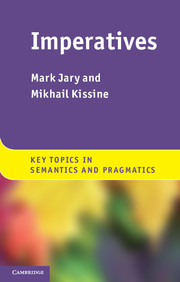Book contents
- Frontmatter
- Contents
- Acknowledgements
- List of abbreviations and notation
- Introduction
- Part I The data
- Part II The theories
- An opinionated conclusion
- Appendix A Possible worlds and semantics
- Appendix B Modality in possible-word semantics
- Appendix C Stalnaker’s common-ground model of assertion
- Glossary
- References
- Index
Appendix B - Modality in possible-word semantics
Published online by Cambridge University Press: 05 July 2014
- Frontmatter
- Contents
- Acknowledgements
- List of abbreviations and notation
- Introduction
- Part I The data
- Part II The theories
- An opinionated conclusion
- Appendix A Possible worlds and semantics
- Appendix B Modality in possible-word semantics
- Appendix C Stalnaker’s common-ground model of assertion
- Glossary
- References
- Index
Summary
Modal verbs such as must and can have a number of possible uses. For example, must can express both obligation and certainty (relative to some body of information):
(1) Jack must go to jail.
(2) John must be a spy.
And can can express both permission and possibility.
(3) You can come in now.
(4) You can get the grades you want (if you study hard).
These are not the only uses that these verbs have. A large number of uses have been identified for each of them, and for the other modals (see, for instance, Papafragou (2000); Portner (2009)). The problem that this presents to the semanticist is how best to analyse these uses: are they evidence of ambiguity, or can a kernel of core meaning be identified that explains the range of possible uses each verb has? Kratzer (1977, 1991), in a move that has proved extremely influential in formal semantics, argues for the latter.
- Type
- Chapter
- Information
- Imperatives , pp. 297 - 302Publisher: Cambridge University PressPrint publication year: 2014

